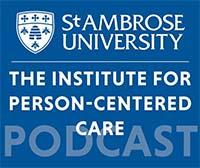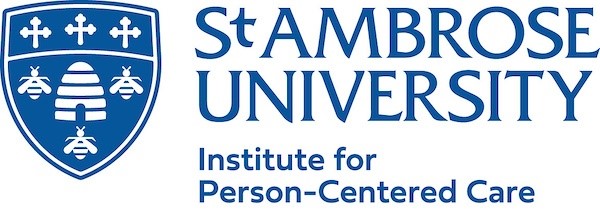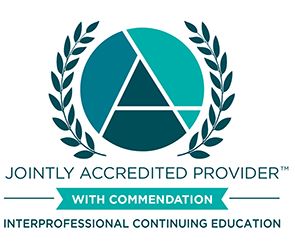
IPCC Podcast: Innovating Behavioral Health-Addressing the Mental Health Crisis through Collaborative Care and Technology
 |
The Institute for Person-Centered Care at St. Ambrose University is challenging the status quo of health and wellness in our communities. Join us as we delve into cutting edge strategies to tackle health and wellness challenges through innovation and a person-centered perspective. Whether you are a health and human service practitioner, or community member, our discussions offer valuable insights tailored to your interests and needs. Tune in and be part of the transformative discussions where person-centered care comes alive!
Join two leading experts in behavioral health as they dive into the pressing issue of the growing demand for mental health services versus limited access to equitable care in the United States. Discover how the Collaborative Care Model serves as a powerful framework to seamlessly integrate mental health services into primary care, with a focus on expanding access in rural communities. The conversation also explores innovative digital tools that can streamline care coordination and boost patient outcomes, paving the way for a more connected and efficient approach to mental health care.
Episode Learning Objectives:
By the end of this episode, individuals as members of the health care team will be able to:
- Explain the factors contributing to the growing demand for mental health services.
- Discuss how the Collaborative Care Model can enhance mental health outcomes in various settings while supporting the Quadruple Aim.
- Discuss the role of digital tools in enhancing care coordination and improving patient outcomes within behavioral health services.
Statement of Need and Purpose
Mounting evidence consistently demonstrates that integrating person-centered care approaches into health and human services leads to heightened satisfaction among both patients and providers, alongside improvements in quality and safety outcomes.
Interdisciplinary team members do not always effectively coordinate care, prioritizing the individual or population at the center to impact positive health outcomes. These team members can enhance their knowledge, skills, and attitudes about person-centered care by listening to this podcast.
Professionals spanning health, social services, and beyond will engage with experts, students, and community members through storytelling, sharing innovations, and applying enriched practices of person-centered care to address both current and future challenges in their respective fields.
Intended Audience
This podcast meets the professional development needs of physicians, nurses, physician assistants, pharmacists, psychologists, social workers, caregivers, and others with interest in person-centered care.
Elements of Competence
This educational activity is designed to change learner competence and focuses on the following competency areas:
- The American Board of Medical Specialties: Practice-based learning improvement, Interpersonal and Communication Skills, Professionalism, and Systems-based Practice
- Nursing and Interprofessional: Values/Ethics for Interprofessional Practice, Roles/Responsibilities, Interprofessional communication and Teams, and Teamwork
- Center for the Advancement of Pharmacy Education: Communication, Cultural Sensitivity, Educator, Health and Wellness, Innovation and Entrepreneurship, Interprofessional Collaboration, Leadership, Patient Advocacy, Patient-Centered Care, Population-Based Care, Professionalism, and Self-Awareness
- Social Impact and Belonging: Engage in Self-reflection, Address Differences in Health Outcomes, and Value Culturally Centered Care
Global Learning Objectives
By the end of this podcast series, individuals as members of the health care team will be able to:
- Describe and apply the tenets of person-centered care.
- Discuss insights, best practices, and innovative solutions for person-centered care in their individual practice and among the healthcare team.
- Explain the role of the care team in applying the principles of person-centered care to enhance population health.
The University of Wisconsin–Madison Interprofessional Continuing Education Partnership (ICEP) and St. Ambrose University Institute for Person-Centered Care gratefully acknowledge(s) our sponsors: St. Ambrose University, Kokjohn Grant, Presentation Sisters of South Dakota, Vera French Mental Health Center, and the University of Wisconsin–Madison, School of Nursing (in-kind accreditation support).
Host
Ann Garton Host | Ann Garton, DNP, FPCC, RN, CNE, Associate Professor, Director of the Institute for Person-Centered Care, St. Ambrose University Dr. Ann Garton holds the roles of Professor in Nursing at St. Ambrose University and Director of the University's Institute for Person-Centered Care. Her doctorate focused on global population health. Throughout her career, she has worked in diverse settings, fostering quality person-centered care for our most vulnerable populations. She has been recognized as a Fellow of Person-Centered Care by Planetree International. As host of the IPCC Podcast, she shares best practices in person-centered care with experts from across the country. |
Guests
Sarah Oliver Guest | Sarah Oliver, PHD Sarah has nearly 30 years of experience in the social work field as a case manager and psychotherapist. She specializes in working with individuals who have experienced trauma. She earned her PhD in Clinical Social Work with a specialization in military and veterans issues and previously earned her MSW degree in Social Work from the University of Iowa. Sarah is the Director of Counseling at St. Ambrose University in Davenport, IA, and has worked with the college-age population for the last eight years. In addition, Sarah has a private practice where she sees Veterans and first responders who have experienced combat and other forms of trauma. Sarah is no stranger to Veterans or Veterans issues, having spent 17 years as a Clinical Social Worker for the Iowa City VA Health Care System. During this time Sarah had specialized experience providing care to Homeless and at-risk Veterans and providing psychotherapy to Veterans. She has been in a variety of front-line social work and leadership roles coordinating with community members and other interested groups to provide the best care to Veterans. In addition, Sarah has taught as an Adjunct professor at the University of Iowa’s School of Social Work for 16 years. |
Luke Raymond Guest | Luke Raymond Luke Raymond is an accomplished leader in behavioral health strategy, operations, and innovation, with over 20 years of experience in the field. A therapist by training, he has spent time in various clinical, strategic, and commercial leadership roles with a strong focus on improving access to care, reducing costs, and delivering effective outcomes. Luke co-authored an article in Psychiatric Times on implementing telepsychiatry in rural settings and has spoken at numerous national conferences, including the Healthcare Information and Management Systems Society (HIMSS), the American Telemedicine Association (ATA), and American Health Insurance Plans (AHIP). Luke has both commercialized and led initiatives that resulted in a 50% reduction in emergency department visits, improved patient and clinician satisfaction and delivered effective digital and virtual care at scale. Luke is certified in trauma-focused cognitive behavioral therapy and integrated primary care therapy. His clinical interests include ADHD, anxiety, and trauma recovery. Luke lives with his wife and daughter in central Illinois, where he enjoys endurance running, fishing, and bourbon outside of work. |
Planning Committee
| *Ann Garton, DNP, FPCC, RN, CNE | Tracy Mrochek, MPA, RN, NPD-BC | Andrew Repp, PHD |
Kari Crowder, MSN | Sarah Oliver, PHD | Cheryl True MD, DipABLM, FACLM |
Julie Kettmann, PhD | Janelle Pillard, MSPA | Emily Vyverberg, PharmD |
* Activity Chair
Policy on Faculty and Sponsor Disclosure
It is the policy of the University of Wisconsin–Madison Interprofessional Continuing Education Partnership (ICEP) to identify, mitigate and disclose all relevant financial relationships with ineligible companies* held by the speakers/presenters, authors, planners, and other persons who may influence the content of this accredited continuing education (CE). In addition, speakers, presenters and authors must disclose any planned discussion of unlabeled/unapproved uses of drugs or devices during their presentation.
For this accredited continuing education activity all relevant financial relationships have been mitigated and detailed disclosures are listed below.
Ineligible companies are those whose primary business is producing, marketing, selling, re-selling, or distributing healthcare products used by, or on, patients. The ACCME does not consider providers of clinical services directly to patients to be ineligible companies.
| NAME | ROLE(S) | FINANCIAL RELATIONSHIPS DISCLOSURE | DISCUSSION OF UNLABELED/UNAPPROVED USES OF DRUGS/DEVICES IN PRESENTATION? |
| Ann Garton, DNP, FPCC, RN, CNE | Activity Chair, Planner, Host | No relevant relationships with ineligible companies to disclose | No |
| David Baker | Committee Member | No relevant relationships with ineligible companies to disclose | No |
| Kari Crowder, MSN | Planner | No relevant relationships with ineligible companies to disclose | No |
| Julie Kettmann, PhD | Planner | BodyMD (Independent Contractor - Consultant) | No |
| Tracy Mrochek, MPA, RN, NPD-BC | Planner, Peer Reviewer | No relevant relationships with ineligible companies to disclose | No |
| Sarah Oliver, PHD | Planner/Speaker | No relevant relationships with ineligible companies to disclose | No |
| Janelle Pillard, MSPA | Planner | No relevant relationships with ineligible companies to disclose | No |
| Luke Raymond | Speaker | No relevant relationships with ineligible companies to disclose | No |
| Andrew Repp, PHD | Planner | No relevant relationships with ineligible companies to disclose | No |
| Cheryl True, MD | Planner | No relevant relationships with ineligible companies to disclose | No |
| Emily Vyverberg, PharmD | Planner | No relevant relationships with ineligible companies to disclose | No |
Accreditation Statement
 | In support of improving patient care, this activity has been planned and implemented by the University of Wisconsin–Madison Interprofessional Continuing Education Partnership (ICEP) and St. Ambrose University Institute for Person-Centered Care. The University of Wisconsin–Madison ICEP is jointly accredited by the Accreditation Council for Continuing Medical Education (ACCME), the Accreditation Council for Pharmacy Education (ACPE), and the American Nurses Credentialing Center (ANCC), to provide continuing education for the healthcare team. |
Credit Designation Statements
American Medical Association (AMA)
The University of Wisconsin–Madison ICEP designates this enduring activity for a maximum of 1.00 AMA PRA Category 1 Credits™. Physicians should claim only the credit commensurate with the extent of their participation in the activity.
American Nurses Credentialing Center (ANCC)
The University of Wisconsin–Madison ICEP designates this enduring activity for a maximum of 1.00 ANCC hours.
Accreditation Council for Pharmacy Education (ACPE)
The University of Wisconsin–Madison ICEP designates this enduring activity for 1.00 hours or .10 CEUs. Credit can be earned by successfully completing the activity and the evaluation. Credit will be provided to NABP CPE Monitor within 60 days after the activity completion.
Universal Activity Number (UAN): JA0000358-9999-24-081-H99-P
AAPA Credit Designation Statement
The University of Wisconsin–Madison ICEP has been authorized by the American Academy of PAs (AAPA) to award AAPA Category 1 CME credit for activities planned in accordance with AAPA CME Criteria. This activity is designated for 1.00 AAPA Category 1 Self‐Assessment CME credits. Approval is valid until 11/14/2024. PAs should only claim credit commensurate with the extent of their participation. |
 | As a Jointly Accredited Organization, the University of Wisconsin–Madison ICEP is approved to offer social work continuing education by the Association of Social Work Boards (ASWB) Approved Continuing Education (ACE) program. Organizations, not individual courses, are approved under this program. Regulatory boards are the final authority on courses accepted for continuing education credit. Social workers completing this course receive 1.00 enduring continuing education credits. |
American Psychological Association (APA)
 | Continuing Education (CE) credits for psychologists are provided through the co-sponsorship of the American Psychological Association (APA) Office of Continuing Education in Psychology (CEP). The APA CEP Office maintains responsibility for the content of the programs. |
Continuing Education Units (CEUs)
The University of Wisconsin–Madison, as a member of the University Continuing Education Association (UCEA), authorizes this program for 0.10 continuing education units (CEUs) or 1.00 hours.
Available Credit
- 1.00 AAPA Category 1 CME
- 1.00 ACPE Contact Hours - Pharmacist
- 1.00 AMA PRA Category 1 Credit™
- 1.00 ANCC Contact Hours
- 1.00 APA CE Credits
- 1.00 University of Wisconsin–Madison Continuing Education Hours
- 1.00 Approved for AMA PRA Category 1 Credit™
Registration for this activity can only be completed through the ICEP Learning Portal. Attendee registrations made through any other sites cannot be honored. UW-Madison ICEP is not able to refund fees paid through unaffiliated registration sites, such as eMedEvents.com, MedConfWorld.com, EventEgg.com, and 10times.com. Please report any unauthorized websites or solicitations for registrations to [email protected].
Accessibility
If you need anything to participate in this program, please contact [email protected].
Required Hardware/software
Free, current version of Internet Explorer, Firefox, Safari, or Chrome with audio. Some older browsers and Microsoft Edge could produce error messages or not display the content correctly.
Current Adobe Acrobat Reader, or other PDF viewer.

 Facebook
Facebook X
X LinkedIn
LinkedIn Forward
Forward

